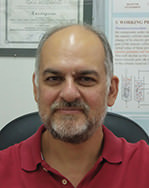About Us
“The Hellenic Society of Nanotechnology in Health Sciences (HSnanoHS) was established in Greece in December 2016. The society is a multidisciplinary body consisting of scientists from different scientific areas.
The aims of the HSnanoHS are to:
- Advance knowledge in the field of Nanotechnology in Health Sciences;
- Promote and disseminate the research, educational and professional activities of its Μembers, at a national and international level;
- Promote collaboration, interaction and complementarity among its Μembers;
- Promote networking of key-actors in the field of Nanotechnology in Health Sciences, at a national level;
- Promote networking and collaboration of the Society with national and international scientific, research, funding and investment institutes;
- Promote collaborations between national and foreign institutes, active in the field of Nanotechnology in Health Sciences;
- Promote the common stand point of the Μembers of the Society to public authorities;
- Promote the resolution of issues concerning the legal/regulatory context applicable in connection with activities of research, development and business, in the field of Nanotechnology in Health Sciences;
- Promote activities supporting the increase of the availability of national funds for education, research, and development, in the field of Nanotechnology in Health Sciences.
- Any other activity relevant to the aims of the Society.”

Efstathopoulos Efstathios
Professor of Medical and Radiation Physics in Medical School, National and Kapodistrian University of Athens (NKUA)
He is delivering clinical work into the Hospital being Radiation Protection Supervisor for all Radiological units and units of Radiotherapy and Nuclear Medicine.
He is teaching at Medical and Nurse Schools, Radiation Protection and Medical Imaging with x-rays. He is also teaching at four Postgraduate Programs.
His research focuses on patient and personnel x-ray dosimetry and quantification of the risk resulting from this, in imaging of the heart and blood vessels and applications of nanomedicine in imaging.
He has published more than 80 original papers in international scientific journals, which have been received more than 1500 citations to international articles and books.
He is author of three chapters in scientific books. He has presented more than 100 scientific congress announcements and has given more than 40 invited scientific congress lectures.

Costas Demetzos
Professor of Pharmaceutical Nanotechnology, Director in the Laboratory of Pharmaceutical Technology, Department of Pharmacy, National and Kapodistrian University of Athens. President of Hellenic Pharmaceutical Society (HPS).
He also serves as Director of the Laboratory of Pharmaceutical Technology and since 2008 as President of the Hellenic Pharmaceutical Society.
His research interest is primarily on Pharmaceutical Nanotechnology (lipidic, polymeric and mixed drug delivery nanosystems), Physical Pharmacy, Pharmaceutical Compounding and Regulatory Aspects.
He has published more than 210 research papers, two monographs, co-authored one book and edited three books. He has also been awarded in Pharmaceutical congresses and from the Hellenic Society of Biomaterials for his contribution on the application of bionanomaterials.
The innovation of his research, apart from being in numerous publications and announcements in international scientific journals and conferences, has led to awards of international and national patents in Greece and in many European countries, USA, Australia, having as main objects the nanotechnological drug delivery systems and nanodevises.
His research work has international recognition and there are more than 3.200 cross references related to his research (h index 30). Being a scientific director he participates in national and European research programs.
He teaches in the Faculty of Pharmacy of the National and Kapodistrian University of Athens since 1991, initially Chemistry of Natural products and following in 2002 he teaches his main subject, Pharmaceutical Nanotechnology and Pharmaceutical Physics in undergraduate and postgraduate level.
He was responsible for dozens of PhD students and their theses, Master’s Diplomas and Undergraduate Dissertations. Also, he has been invited to teach Pharmaceutical Nanotechnology in Greek Universities and in the European summer schools.
It must be mentioned that he participates as a member of Organizing Committees but also as a president of International and European scientific Conferences, while being an evaluator in many committees like the Greek Ministry of Health, the Qualification Recognition Board in Cyprus, the Greek National Scholarships Foundation, the Greek Drug Administration Office, etc. He acts as a member of the editorial board of scientific journals.

Spyridon Kintzios
Professor at the Department of Biotechnology and Director of the Laboratory of Cell Technology, Agricultural University of Athens (AUA). Dean of the School of Food Science, Biotechnology and Development.
Professor Spyridon Kintzios has received his Ph.D. in Genetics from the Technical University of Munich. He is the Director of the Laboratory of Cell Technology, Agricultural University of Athens (AUA) and, currently, the Dean of the School of Food Science, Biotechnology and Development.
He has a working experience of over 28 years in Biotechnology, particularly in the fields of Biosensors and Cell Biology. He is the author/co-author of 99 peer-reviewed articles in cited international scientific journals (h = 20), three reference books as well as the author or co-author of more than 90 international book chapters and conference presentations.
He is also the editor of four international books, a fellow of several Scientific Societies and the recipient of the “Georgia Christodoulopoulou” Award for the Best Virological Method, the Award of the Greek Society for Free Radical Stress Research and the Distinguished Service Award in Defense Science. He is the inventor of the Bioelectric Recognition Assay (BERA) and the technology of Molecular Identification through Membrane Engineering (MIME).
He holds five national and two international patents. He is reviewer of submitted manuscripts in more than 30 international scientific journals and a board member of two journals.
He was also a reviewer for European projects of the 6th framework and a reviewer for the National Science Foundation (NSF), the Austrian Science Fund and the New Zealand Ministry of Business, Innovation & Employment (MBIE) projects. He has coordinated and co-coordinated 28 EU and internationally funded research projects.
Dr. Kintzios is a founding Board member of the Hellenic Biotechnology Cluster (HBio) and the Hellenic Society for Nanotechnological Applications in Medicine and Health Science (ELENEPY).
He is a permanent member of several public and industry committees in Greece and abroad, including the National Agricultural Academy (elected full member).

George Loudos
Assistant Professor in the Department of Biomedical Engineering and Director in the Laboratory of Medical Instrumentation, Department of Biomedical Engineering, Technological Educational Institute of Athens.
Dr. George Loudos, was born in 1975. He is an Assistant Professor in the Department of Biomedical Engineering, Technological Educational Institute of Athens, since 2008.
He received his Diploma in Electrical Engineering in 1998 and his PhD in Biomedical Engineering in 2003 from the National Technical University of Athens, Greece.
He has published 103 articles in international journals and has more than 250 publications in conference proceedings and ~900 citations. He has given 45 invited lectures and holds one patent.
He is the director of the Medical Instrumentation Laboratory. His research interests are focused on Molecular Imaging using Nuclear Medicine Techniques and Medical Instrumentation.
More specifically he is working on the development of dedicated imaging systems for SPECT/PET and combined imaging, as well as their application in preclinical research for the study of molecular mechanisms, radiopharmaceuticals and drug delivery with nanoparticles.
Currently, he coordinates the Horizon 2020 project Vivoimag (Marie Curie RISE) and has coordinated the FP7 project OncoNanoBBB (IAAP Marie Curie), the COST Action “TD1007: Bimodal PET-MRI molecular imaging technologies and applications for in vivo monitoring of disease and biological processes” and the National Excellence Project “HYPERGNOSTIC: Development of hybrid molecular imaging systems for Theragnostic applications”.
In addition, his group has participated in several projects including FP7 project TRIMAGE “A dedicated trimodality (PET/MR/EEG) imaging tool for schizophrenia”, the COST Action “TD1004: Theranostics Imaging and Therapy: An Action To Develop Novel Nanosized Systems For Imaging-Guided Drug Delivery”, FP7-NMP NANOTHER, as well as other smaller national projects.
He is actively participating in the organization of several international conferences, workshops and meetings. In 2012 he was elected as a member in ΙΕΕΕ Nuclear and Medical Imaging Sciences Council. Since 2016 he is a founding member and treasurer of Hellenic Society of Nanotechnology in Health Sciences.

Maria Gazouli
Associate Professor of Molecular Biology, Medical School, National and Kapodistrian University of Athens, Athens, Greece
Maria Gazouli, is Associate Professor of Molecular Biology, Medical School National and Kapodistrian University of Athens, Athens Greece. She was admitted as a PhD student at the Biology Department and Medical School of National and Kapodistrian University of Athens and granted by honored Hellenic Pasteur Institute scholarship.
She continued her postdoc training in Cell Biology Department, Georgetown University Medical Center, Washington DC USA. Dr M. Gazouli work refers mainly to molecular basis of diseases mainly autoimmune diseases and cancer, to molecular detection of pathogens and the investigation of the pathogenesis of the diseases they cause to humans and animals.
These activities have produced 215 publications in peer reviewed journals, 7000 hetero-citations, 130 announcements in scientific congresses that were awarded in 17 cases 1 granted International Patent and 3 European Patent Applications. Dr Gazouli was also involved in the incorporation of nanotechnology to targeted cancer detection, imaging and drug delivery.
She honored with Fulbright Scholarship for the Development of Nanotechnology-based Biosensor Arrays for the Detection of Circulating Colorectal Cancer Cells at University of Maryland, College Park, MD, USA.
The research has been recognized by distinguished awards and funded by national and international (EU) competitive research grants. Maria Gazouli has been actively involved in undergraduate and post graduate training, as well as ERASMUS program and her laboratory has trained a significant number of young scientists.
